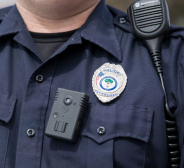Task force pushes for more police body cameras in Chicago

A task force convened to reform Chicago’s policing practices in the wake of protests is pushing the city to expand its use of police body cameras and adopt a policy to expedite the release of the footage they collect.
Mayor Rahm Emanuel’s Police Accountability Task Force — a group of policing experts, advocates and academics — released its report last week with a host of recommendations for how Chicago police can improve their relationship with the community after revelations about the fatal shooting of a black teenager named Laquan McDonald at the hands of an officer prompted a public outcry. The document specifically calls for the department to equip every officer who “regularly comes into contact with citizens” with body cameras, expanding on the pilot program the city launched in January 2015.
The report praises the technology’s potential to “promote accountability and transparency” in the community, as well as “de-escalate encounters, resulting in improved behavior among both police officers and the public.” However, the task force also notes that the cameras have the potential to “help pay for themselves” by cutting down on fraudulent police misconduct claims and cut down on “the more than $600 million the city has paid to resolve police misconduct cases since 2004.”
In addition, the group suggests that the city “continue to evaluate” body camera policies covering issues like “what to record, how to record and store recordings and how to ensure that officers comply with the policy and properly use the cameras,” especially in light of the new state law that took effect at the start of 2016 laying down statewide standards for using the cameras.
Neither Emanuel’s office nor Dean Angelo, the head of the Chicago police union, responded to requests for comment from StateScoop on the report’s recommendations on body cameras.
For their part, civil rights advocates are cautiously optimistic about the report. Kevin Keenan, chief operating officer and legal counsel for the NAACP Legal Defense and Educational Fund, told StateScoop that he was glad to see the task force recognized the “broad consensus that body worn cameras are an important tool of accountability” but he plans to closely monitor how the city uses the technology going forward.
“We really need to keep the focus on holding the police accountable to the public’s expectations of their behavior and not reinforcing the infrastructure that’s surveilling the public,” Keenan said. “There have to be very strong policies proscribing how cameras are to be used.”
[Read more: Illinois weighs bills to speed access to police video footage]
Indeed, Keenan called it a bit “surprising” that the report didn’t address how the cameras are used in conjunction with “other kinds of surveillance technology” police are employing like biometric facial recognition software.
“We believe that we need to look two steps ahead and put in protections so that communities that have already experienced disproportionate police enforcement don’t further accumulate disproportionate police surveillance,” Keenan said.
However, Keenan views the task force’s recommendations around how the city should handle the release of body camera footage considerably more favorably. The task force released a model policy on the subject back in February and included it once more in its final report, and it stipulates that police should release videos of all officer-involved shootings and any incidents where an officer kills or severely injures someone within 60 days on an online portal.
Police and prosecutors can request an extension to shield the footage for an additional 30 days if they can prove that its release would compromise an investigation, but then all videos must be made public. Considering that the video of McDonald’s killing only saw the light of day following a lengthy legal battle spearheaded by an independent journalist, Keenan said it was vital for the city to change its practices in the area.
“It’s always going to be a balance between the public’s right to know and individual privacy, as well as the needs of investigations,” Keenan said. “An automatic 60-day release is a valid contribution to the experiments being done in how to strike that balance.”
Once the task force released the policy, Emanuel issued a statement pledging that he “will work to ensure [the recommendations] become the rule going forward” for the department.
Keenan admits that “there’s lots of reasons to be wary and cynical about the prospects of meaningful police change” stemming from the administration’s adoption of the report’s suggestions — after all, the report’s authors note that they’re “at least the sixth task force to recommend reforms to CPD” — but he feels the specter of the federal Department of Justice’s investigation into how the department handled the McDonald case makes it “more likely” that things actually change in the city.
“That Department of Justice investigation can result in a court-monitored consent decree to really implement reforms,” Keenan said.
Contact the reporter at alex.koma@statescoop.com, and follow him on Twitter @AlexKomaSNG.






